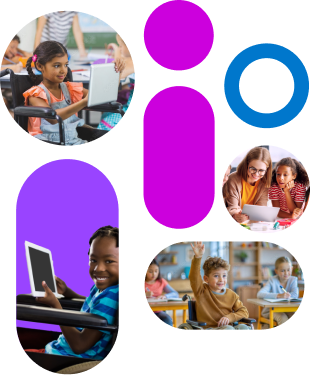The Global Perspective: Rebuilding Equitable Education through Digital Literacy
Five experts from global nonprofits and Silicon Valley share insights and strategies for closing the digital divide and leveraging edtech to advance literacy for children in need
On May 11, Benetech hosted the third event in a three-part series focusing on equity in education and how technology and community can come together to enable inclusive access to learning. The first event covered the promise and limitations of digital technology, while the second event addressed strategies for closing learning gaps to ensure a level playing field for academic achievement through reading.

Ayan Kishore, Benetech CEO, moderated the thought-provoking discussion with four expert panelists:
- Dr. Homiyar Mobedji, Bookshare Program Manager for Asia/Africa
- Anthony Bloome, Founder and Executive Director of mEducation Alliance
- Radhika Shah, Impact/Tech Investor, Illumen Capital
- Shelly Hartman Sunyak, Senior Program Manager, All Children Reading, World Vision
Digital Literacy is Roadmap for Educating the Blind in India
Dr. Homiyar Mobedji opened the discussion with a story about a pandemic journey for students and allies focused on workforce development in India. For hundreds of years, blind education has been synonymous with braille. During pandemic-induced remote learning, however, teachers found it difficult to educate blind students when they weren’t in front of them. In response, the Bookshare India team brought in digital tools, digital content, and tutorials to train teachers and students. The team uses Android phones, external keyboards, Bookshare content, and text-to-speech engines in English and vernacular languages: tools that are affordable, accessible, and available. This approach to digital literacy breaks down barriers and prepares blind students for inclusion in the global market.
“It’s so important to be able to live a life of dignity. If visually impaired individuals have the right skill sets, the right tools, the right training, and the right opportunity, they can contribute on par with any other person.”
– Dr. Homiyar Mobedji
Accessible Edtech and Role Modeling Create Possibilities in Global South
Tony Bloome described how mEducation Alliance is the world’s largest convening platform for development and donor agencies focused on the role of edtech to advance quality educational outcomes in low resource settings. “It is so important to build in positive role models of women, individuals with disabilities, and other marginalized populations – in addition to accessibility features — when creating new educational content,” says Tony. Examples include eKitabu’s accessible EPUB toolkit to build your own accessible content, EnAble India, a nonprofit that works for economic independence and dignity of persons with disabilities, and an app called Be My Eyes that connects blind and low vision people to sighted volunteers who provide assistance via video calls.
Technology Creates and Closes Digital Divides
Radhika Shah is passionate about human rights and gender equity. What are some challenges that she sees – and promising solutions? “This pandemic has forced a race into the digital age, and yet technology is creating new divides,” she explains. “Women and girls, indigenous refugees, and differently abled children are getting left behind.”
She says it is necessary to shift mindsets and reimagine education if we are to achieve equitable education for all (UN SDG4). That means including all children in the digital transition. For example, BRAC Humanitarian Play Labs combine the science of play with psychosocial support that promote healing, learning, and development for displaced Rohingya children. Children need emotional support before they can learn. Another example is how ZNQ Global uses interactive games on mobile phones to present health and safety information to girls in India, Afghanistan, and Uganda.
Edtech Advances Child Literacy
All Children Reading, a Grand Challenge for Development (ACRGCD) is a partnership between USAID, World Vision, and the Australian government. “It supports more than 584,000,000 children globally, including children with disabilities, who do not have basic reading skills,” says Shelly Hartman Sunyak. “One very positive impact we’ve seen is that bedtime stories come alive for parents whose children are blind or deaf because they have access to digital accessible storybooks with audio and sign language.” ACRGCD cohorts are producing the highest quality books in the smallest file sizes so that they can be used in low-resource contexts like Somalia, Samoa, and Papua New Guinea.
“With Global Accessibility Awareness Day on May 19, it is important to get everyone talking, thinking and learning about inclusive education,” said Ayan in his closing remarks. “We hope that today’s event and the two before it push the global conversation forward to define and implement ways to leverage technology so people in need around the world can read, learn, and thrive.”
Learn More About the Inclusive Education Series
Benetech’s Inclusive Education Series included three virtual events:
- The Global Perspective: Rebuilding Equitable Education through Digital Literacy
- It Takes an Ecosystem: Harnessing Tech and Community for Education Equity
- Ensuring Equitable Access to Digital Literacy Tools for All Students with Reading Barriers
Learn more about Benetech’s work. Sign up for the newsletter.
